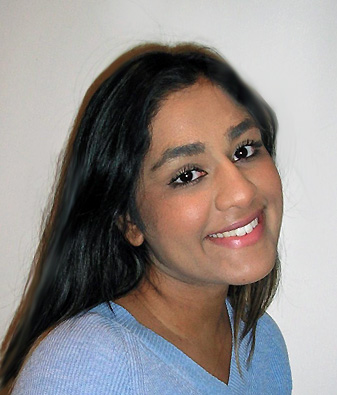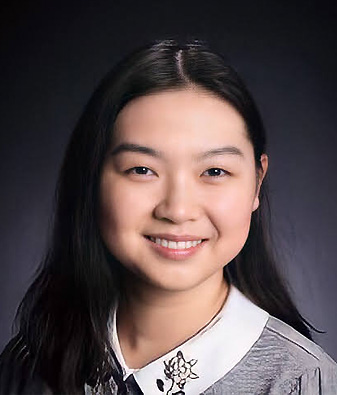In the midst of uncertain times, two dynamic Arts & Science students have shown a remarkable commitment to creating positive change with their social justice and humanitarian work.
For their efforts, Ashwini Selvakumaran and Jolie Gan were recently presented with the Diana Award — a prestigious prize recognizing people from age 9 to 25 around the world who have demonstrated a notable ability to improve the lives of others.

Established in 1999 and named as a charitable legacy after Diana, Princess of Wales, the yearly award recognizes several hundred of the world’s best and brightest young leaders. All of them have worked tirelessly for their communities as founders, campaigners, fundraisers and visionaries.
One of only 10 Canadian winners, Selvakumaran is a member of St. Michael’s College. The fourth-year student is majoring in peace, conflict & justice studies at the Munk School of Global Affairs & Public Policy, with minors in diaspora & transnational studies and English.
With her unique background, Selvakumaran is in a better place than most to understand many of the world’s most pressing global problems. The daughter of a diplomat with the United Nations, she was born in Malaysia and grew up in several different countries around the world, some of which — such as Yemen and Kazakhstan — were afflicted by poverty and conflict.
“We were constantly on the move because of my father’s work,” she recalls. “That was difficult. But when I got older, I realized that those experiences gave me a unique, global perspective.”
Having settled in Canada during her high school years, she felt the need to go beyond the limits of her education and examine issues at a grass-roots level: “what kickstarted my advocacy was a need to engage the voices that needed to be validated the most.”
Since then, Selvakumaran has worked with a variety of non-profit organizations in Ontario, such as the Iroquoia Bruce Trail Club, Plan International Canada, and the Canadian Voice of Women for Peace. In addition, she’s been instrumental in establishing several different organizations both within and outside the University.
Perhaps the most significant has been the Brown Citizen Circle (BCC), which Ashwini founded last year with the aim of fostering opportunities for Black, Indigenous and South Asian youth. Last summer, she led her team in raising over $10,000 for a national youth social policy case competition.
The time for change is now. And no avenue is too small, because everything you do can contribute to something bigger and more sustainable.
With the help of a COVID-19 Engagement Award from U of T in 2020, she also co-produced a book entitled COVID-19 Perspectives with fellow student Aishwarya Patel. The publication comprises 19 interviews with youth around the world, with all proceeds going to frontline health care workers.
Selvakumaran sees the book as an antidote to the despair that she and others were feeling at the start of the pandemic. “Every single person we interviewed had a positive outlook, and saw COVID-19 as an opportunity to attack issues that need attention: even our youngest interviewee, who was only 11 years old. Just doing the book changed my own perspective so much.”

For her part, Jolie Gan has only just started her university journey — but her career as an advocate for youth is already well-established. As she’s in first year, the member of Trinity College has yet to declare a major. But she already has a definite career goal in mind: “I hope to become a health policy-maker or lawyer, and create sustainable change in our health care system,” she says.
The daughter of immigrants from Malaysia and Hong Kong, Gan’s interest in health began at the age of 12, when her mother was suddenly hospitalized with a brain aneurysm from which she’s since recovered. Forced to juggle schoolwork while caring for her infant siblings, Gan experienced the Canadian health care system’s limitations first-hand.
“I saw how there wasn’t a lot of support for families; especially for young people, immigrants and people of colour. But I realized that there was no point in sitting around and not taking action.”
Gan reached out to a teacher who had connections with Royal Canadian Mounted Police, and began serving on their youth advisory committee. She’s since held volunteer policy positions with the United Nations and the Alberta Children’s Hospital Foundation, and worked as a researcher in health law at the University of Calgary. She is currently completing a global health policy and anti-poverty fellowship with Results Canada, and has been hired as a student employee to assess risk, risk management, and policy with the Canadian Food Inspection Agency.
She is also a founding president of an organization called Youth Leaders in Law. The non-profit seeks to create a more diverse legal workforce, and to provide young people with resources needed to start their own legal careers. Via three hosted conferences, Youth Leaders in Law has already connected 1,000 students in 11 countries with a wealth of mentorship opportunities and information.
Gan describes the Diana Award as a “huge honour,” noting that the awards presentation itself gave her the opportunity to connect with “amazing mentors and changemakers from other countries. It was a phenomenal experience.”
Gan and Selvakumaran’s achievements testify to the fact that even when the world slows down, its inhabitants need not. “The time for change is now,” says Selvakumaran. “And no avenue is too small, because everything you do can contribute to something bigger and more sustainable.”

